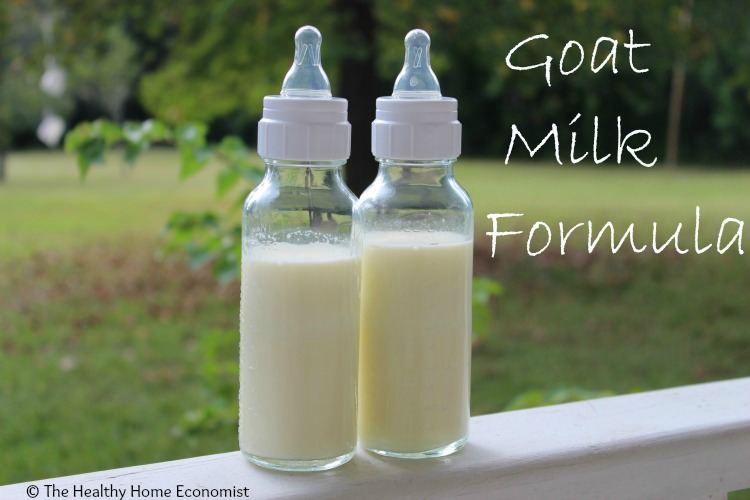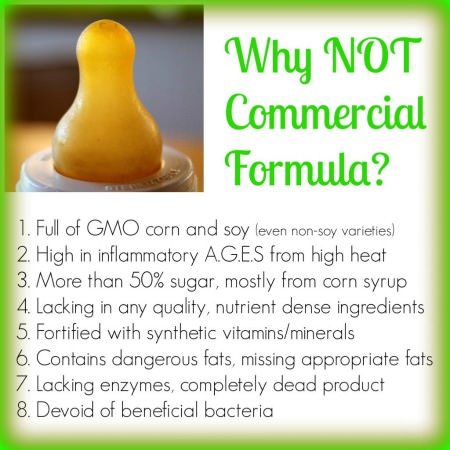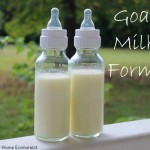How to make a nourishing homemade goat milk baby formula that mimics human breastmilk as closely as possible.

I nursed all 3 of my children exclusively until they started solid foods. In addition, I practiced extended breastfeeding, nursing each of my first two children for 2 years and the youngest for 4 years. I only used homemade formula occasionally such as after surgery.
I adored every. single. minute.
Nursing my children was a glorious experience the memories of which I will cherish forever! I’m sure most breastfeeding mothers would report the same.
The topic of homemade formula, even the more widely accepted goats milk formula, is a highly charged and controversial subject. In reality, it is a very important option for women to consider and have available who are not able to have a breastfeeding relationship with their baby.
This is because unpasteurized, donor breastmilk is not always available from reputable sources and in sufficient quantities to meet a baby’s growing appetite. A friend of mine is dealing with this very situation right now with her adopted daughter.
While she does her best to secure quality donor milk, the truth is that it isn’t enough, and she must supplement. Her first choice depending on local farm availability is formula made with raw goats milk as it seems to be digested a bit better by her baby.

Of course, all brands of commercial formula even if organic are best avoided if at all possible. The graphic above summarizes the problems with commercial formula quite succinctly.
Why Goat Milk is Healthy for Baby Formula
With commercial formula best avoided and relying solely on donor breastmilk a risky proposition, the homemade formula becomes an option well worth consideration.
But why goats milk formula in particular?
The reasons could be as simple as the availability of goat milk versus cow milk. The homemade formula is best made with a clean source of raw milk and some parts of the country have raw goat milk far more readily available than raw cow milk.
Another reason could be the digestibility of the formula. The natural homogenization of the fat globules and different structures of the goat milk proteins do make it easier to digest for some babies.
If a baby has trouble with a homemade formula made from raw grass-fed cow milk, for instance, then the next best option would indeed be goats milk formula.
I always suggest to mothers to try homemade formula made with cow milk first.
This is because although goat milk is wonderfully rich in brain-building fats, it must be used with caution in infant feeding.
Unlike cow milk, goat milk lacks folic acid and is low in the nutrient vitamin B12 both of which are critical to the proper growth and development of a baby.
Fortunately, if goats milk formula does indeed become the necessary choice, the inclusion of small amounts of nutritional yeast and organic grated or desiccated liver in the formula easily remedies this dilemma.
Infant Formula?
Below is the recommended recipe for goats milk formula as published by the Weston A. Price Foundation and originally published in the cookbook Nourishing Traditions in 1996.
I personally know at least a dozen women who have used this recipe with great success when raw grass-fed cow milk was either unavailable or did not digest well for their baby.
*You can order all of the required ingredients for the homemade baby formula in one easy package from Radiant Life by clicking here.
Because the goat formula contains liver powder, be sure to use bottle nipples that are designed for thicker flowing liquids. You can get them here.

Homemade Goat Milk Formula Recipe
A nourishing homemade goat milk formula made from goat milk, yogurt or kefir devised and tested by Dr. Mary Enig that matches the nutritional profile of breastmilk as closely as possible.
Ingredients
- 2 cups raw goat milk OR whole goat milk yogurt
- 1 7/8 cup filtered water
- 1/4 cup liquid whey
- 4 Tbl goat lactose
- 1/4 tsp bifidobacterium infantis powder
- 2 Tbl raw or pasteurized cream
- 1/2 tsp cod liver oil unflavored
- 1/4 tsp butter oil unflavored
- 1 tsp sunflower oil preferably organic
- 1 tsp extra virgin olive oil preferably organic
- 2 tsp virgin coconut oil preferably organic
- 2 tsp nutritional yeast
- 2 tsp raw chicken liver OR 1/4 tsp desiccated liver powder
- 2 tsp gelatin
- 1/4 tsp acerola powder
- 1 tsp molasses optional
Instructions
-
Fill a 2 cup Pyrex measuring cup with filtered water and remove 2 tablespoons (this will give you 1 7/8 cup water).
-
Pour about half the water into a pan and turn burner on medium.
-
Add the gelatin and lactose and let dissolve, stirring occasionally.
-
When gelatin and lactose are dissolved, remove pan from heat and add the rest of the water to cool.
-
Stir in the coconut oil and butter oil until melted.
-
Put remaining ingredients in a glass blender. Be sure to use only liquid whey and never powdered whey from making cheese as it will curdle the goat milk formula.
-
Add the water mixture and blend for about 3 seconds.
-
Pour goats milk formula into glass baby bottles or a large glass jar and refrigerate.
-
Before giving to baby, warm glass bottle in a pan of hot water or a bottle warmer (I like these). Never microwave baby bottles!
Recipe Notes
Do not substitute pasteurized milk or goat milk powder as these are heavily processed, denatured and allergenic foods. You may use plain, whole milk goat kefir or homemade goat yogurt in place of the milk portion of the milk if raw goat milk is not available in your area. Whole Foods has a quality brand of goat milk kefir available.
Cow lactose may be substituted for the goat lactose.
Do NOT use ultrapasteurized (UHT) cream. It is highly allergenic. Raw or pasteurized cream is acceptable.
Use only organic, unrefined, low oleic, cold pressed sunflower oil for this recipe. The brand linked to in the ingredients list is recommended.
The raw chicken liver should be frozen for 14 days or longer as recommended by the USDA for safe consumption. It is easiest to grate raw liver when it is frozen! Alternatively, 1/4 tsp of raw, desiccated liver powder may be substituted (find it here).
Collagen powder may be substituted for the gelatin in a pinch (more on peptides in baby formula in this article).
Use the optional molasses only if baby has issues with constipation. Only use as needed.
Homemade Goat Milk Formula Video
Below is an instructional video I filmed for the Weston A. Price Foundation on how to prepare a homemade formula yourself. Enjoy!
More Information
Homemade Nondairy Baby Formula
Why Soy Formula Even if Organic is So Dangerous for Babies
Traveling with Homemade Baby Formula
Feeding an Adopted Baby Without Commercial Formula
State Threatens to Take Baby Over Homemade Goat Milk Formula
Goat Milk Versus Cow Milk








Sarah, do you have any ticks to making sure all of the ingredients dissolve better? I believe the dedicated chicken liver we are using and the acerla powder seem to sink to bottom of bottle and then don’t pass through the nipple very well.
Try pouring the formula in a wide mouth mason jar and blending with a stick blender every time you need to make a bottle.
Thank you for your fast response! And really appreciate this website! We made our first batch last night, and are curious should it clump up or turn to Jell-O like form?
The gelatin in the formula does cause it to go a bit like jello in the fridge but when you warm up a bottle it will re-liquefy.
If my daughter is allergic to dairy and we are using goats milk, do we still use the pasteurized cream or will this still cause an allergic reaction? If we don’t use it, do we substitute it for something else?
Usually the allergic reaction to cow’s milk is from the protein, not the butterfat in the cream. So, raw or pasteurized cow cream should be fine. However, if she has a severe cow milk allergy, then use goat cream (or sheep cream). If you can’t find any then leave it out.
What about freeze dried raw camel milk powder?
Definitely not! Any type of milk powder is denatured, contains oxidized cholesterol, and would be very damaging for baby. https://www.thehealthyhomeeconomist.com/milk-powder/
How long can I keep this in my fridge? I am still exclusively pumping, but not enough. I’d prefer to supplement with a homemade goats milk formula…but I don’t want to make a big batch if it has to be used within 24 hrs.
About 1-2 days. Best to make it fresh every day or every other day. Another alternative is to freeze in single serving breastmilk bags what you won’t use in that time.
Hi Sarah, what are the signs that your baby is intolerant to the cows milk formula? My baby has been on the cows milk formula for over 3 months, but started to develop eczema over a month ago ( which I understand is usually food related), and he’s also has a mucusy cough for a month now. I’m wondering if it is the cows milk, or something else I’m the formula?
If these problems only developed now after 3 months on the formula, it probably isn’t the formula but something else. Teething can cause these types of issues too. However, there is no harm in trying the goat milk formula instead of cow milk to see if that helps. Also, you can make the formula using yogurt or kefir … substituted for the milk portion of the milk. This makes the formula a bit more digestible.
Do I have to use whey in this recipe or is there a substitute for it? Thanks again for all your help!
You may leave it out if your baby is intolerant … there is no substitute. However, it is very easy to get … off plain goat yogurt from Whole Foods in a pinch.
Hi! I am making the goat milk formula but unfortunately can’t find paturized cream that isn’t dairy. I’ve collected all the other ingredients but this one. Is there another substitute I can use? Also I found 100% Pure American Emu Oil. This is listed as the only ingredient but it came in a bottle with a spray top. Thanks so much!
American emu oil is not acceptable. Only use the native Australian emu oil (vetted brand suggested in shopping guide). https://www.thehealthyhomeeconomist.com/resources/#6
Cream is a very important ingredient for the formula. Whole Foods carries Natural by Nature grassfed, pasteurized (not ultra-pasteurized) cream which is fine to use. OR … you can scrape off the goat cream at the top of plain goat yogurt (Whole Foods has a good brand). Another option is to use camel cream (link to mail order company in my shopping guide). https://www.thehealthyhomeeconomist.com/resources/#16
Unfortunately, I have no access to raw goat milk kefir or yogurt (only pasturized) where I am located. I’m not even sure if there is any available in other cities/towns near me. Also, do you think it’s a good idea to add iron (like the liver powder you recommended) while she’s having this problem?
The pasteurized goat milk kefir is fine to use. Just use plain. Whole Foods carries a very good brand in the stores in my city.
Hey, Sarah. My baby is still struggling with painful bowel movements. My baby has this issue at least every other day and I just can’t stand seeing my baby in pain. As you recommended, according to the article on constipation, I’ve tried adding/subtracting the amount of ingredients to the cow milk formula all at once (I’m not sure if that is recommended or not), except for the coconut oil (whenever I personally injest too much coconut oil, it tends to hurt my stomach, so I didn’t want to happen to my baby).
I’ve been giving my baby prunes after my baby has a hard bowel movement and it seems to help a bit. I just don’t know what else to do and I hate seeing my baby in pain. Also, since my baby is 7 months old and should be intaking more iron, I’m afraid the iron will worsen my baby’s constipation, so I’m not even giving my baby any at the moment. Should I start adding some ingredients to baby food instead, to make sure my baby is getting all the ingredients (sometimes, my baby leaves one or two ounces left in the bottle after a feeding)? Or should I just feed my baby prunes everyday? Any advice would help, thank you!
Have you tried making the formula with goat kefir or goat yogurt substituted for the milk portion?